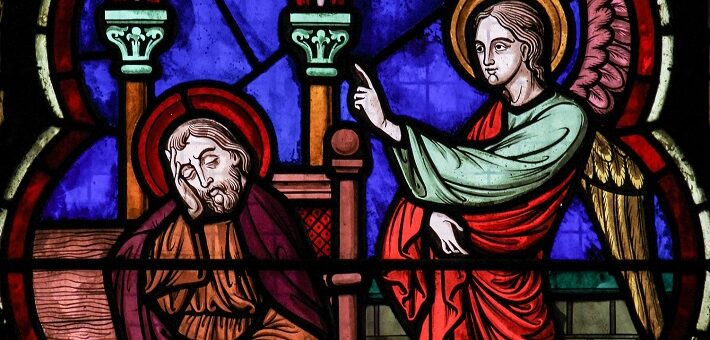Commentary on Matthew 1:18-25
Any New Testament text, including this one, comes from a time, place, culture, and language very different from our own. Therefore, to read New Testament texts well, we need to understand and imagine the life of the people of the 1st century world as best we can.
Matthew’s gospel is commonly dated circa 85 of the 1st century, perhaps in the city of Antioch in Syria. The community which gives us this gospel lived as subjects of the oppressive Roman Empire. Just 15 (or so) years prior to its writing, Rome had brutally defeated a Jewish revolt in Israel, destroying Jerusalem in the process. Followers of Jesus in Antioch and anywhere nearby would have been aware of and impacted by that horror. As Jewish leaders worked to hold Judaism together in the aftermath of this tragedy, Jewish Christ followers apparently found themselves having to choose between their faith in Jesus as God’s Messiah and their home in the synagogue.
Thus began the tensions that eventually led to the separate religions of Judaism and Christianity. In the middle 80s of the 1st century, however, this gospel seems to have come from a group of believers with continuing, though troubled, ties to the Jewish community in their area. This gospel writer insists that Jesus is the fulfillment of God’s promises of redemption. Jewish prophets and apocalyptic thinkers had declared that God would act in creation to judge those who’d done evil, vindicate and heal the righteous ones, and renew all of creation in justice and peace (see for example, Isaiah 24-27). This hope shapes Matthew’s story of Jesus as we’ll soon see.
Matthew 1:18-19
As Matthew begins his narrative, we’re told that Mary and Joseph were married (not engaged or betrothed as most English translations have) but not yet living together. To appreciate this story fully, we need to understand arranged marriages in the 1st century world. We must set aside our ideas of falling in love or finding a soulmate as chief reasons to marry. First century marriages were economic arrangements between honorable fathers for the primary purpose of producing legitimate male heirs for the husband’s household. Spouses may well have come to love each other (there are indications that this happened), but love wasn’t the reason for the marriage.
So, the marriage between Mary and Joseph had been arranged and was already “legal,” which is why Joseph is referred to as Mary’s husband and divorce (the word used in some English translations) is mentioned in verse 19. But Mary hadn’t yet gone to live with him (he might have needed to finish living quarters or an apprenticeship).
In this world which was without blood tests or DNA tests, the only way to know a male child was the legitimate son of a woman’s husband was for the wife to be a virgin when she moved into her husband’s home, and for other men not to have access to her after she did. So Mary becoming pregnant at this moment in the marriage created a huge problem for both Mary and Joseph. With his and his family’s honor at stake, Joseph decides to divorce her.
Matthew 1:20-25
Dreams in the ancient world were commonly considered openings through which human beings encounter the spiritual realm. Good Bible readers may remember the story of another Joseph who had an impactful dream (Genesis 37).
In our story this Joseph has a dream in which an “angel of the Lord” appears and speaks to him. The term “angel of the Lord” is significant, for in the Jewish apocalyptic tradition “angels of the Lord” bring messages from God which reveal the unfolding of God’s purposes for creation. Joseph’s “angel of the Lord” is doing exactly that, as is indicated by Matthew telling us, “All this took place to fulfill what the Lord had spoken through the prophet” (22).
So, this angel’s message to Joseph reveals that God is fulfilling God’s promises to judge those who’d done evil, vindicate and heal the righteous ones, and renew all of creation through the baby boy Joseph is to name Jesus, who was conceived by the Holy Spirit. As readers already know, Mary had not behaved unrighteously, so Joseph should bring her into his home as his wife (which he does in verses 24-25).
We shouldn’t miss the affirmation in the story that God is faithful and trustworthy. God had promised, and God is keeping those promises.
“Emmanuel”
The angel specifically told Joseph to name the baby Jesus but also quoted “the prophet” who had declared that God’s anointed one would be called “Emmanuel,” meaning “God is with us.” Significantly, Matthew ends his gospel with the Risen Christ declaring, “I am with you always.” So our writer “frames” his gospel with proclamations of God’s presence with us in Jesus the Christ.
There’s a good chance we love hearing that “God is with us.” Further, we’re likely accustomed to praising God’s presence with us when things go well. Even Super Bowl winners often say they wouldn’t have won without God’s blessing. 1st century people might speak similarly about their gods. Rome, for example, declared the gods to be with them, for how else could they rule the world without the favor and presence of the gods?
In this context we should note the audacity of the claim our gospel writer makes in his day. As Roman oppression caused suffering, as the Holy City lay in ruins, as Jewish followers of Jesus increasingly found themselves unwelcome in the synagogue which impacted their family and economic life, even in these circumstances our writer begins and ends his story of Jesus with affirmations of Emmanuel, God is with us.
All indications are that our writer knew dark and difficult days. In the midst of them he tells his audience that God is trustworthy, God is fulfilling promises long made, God has launched the renewal of all creation, and God is with us in Jesus. Always. Here are words of “comfort and joy” for any of us who read this gospel in any time: “God is with us!” Always.
PRAYER OF THE DAY
God of promise, you made a commitment to Joseph that you would make Jesus a savior to all. Renew your commitment with us, so that all may know the saving grace of your son, Jesus. We pray these things in the name of Jesus Christ, our Savior and Lord. Amen.
HYMNS
All earth is hopeful ELW 266
Peace came to earth ELW 285
Joy to the world ELW 267, H82 100, UMH 246
CHORAL
I look from afar, Palestrina/Shephard


December 18, 2022